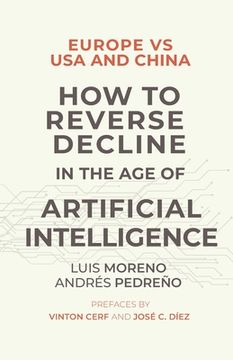Europe vs USA and China. How to reverse decline in the age of artificial intelligence (en Inglés)
Reseña del libro "Europe vs USA and China. How to reverse decline in the age of artificial intelligence (en Inglés)"
Preface by Vinton Cern.Andrés Pedreño and Luis Moreno draw attention to the European reaction to digital technologies which they characterize as regulatory out of concern for privacy, ethical abuse and perhaps also job losses in consequence of automation. Their worry is that in their zeal to protect Europeans (and others) from real or imagined harms, regulators have also hobbled the development of new applications enabled by AI and other digital technologies. Coupled with limited technology transfer from research into applications, these ingredients have baked a fallen soufflé which only radical response can remedy. More eggs need to be broken!Although the expression "move fast and break things" has been justifiably discredited, there is a kernel of truth in the "moving fast" part. Rapid and broad exploration of possibilities is called for in a globally competitive environment: it is vital to discover productive paths and to share openly successes and failures. There is an element of risk taking that is closely associated with the digital successes seen in the US and China. European practices of late have tended to favor caution, regulation and low-risk approaches to new developments. And yet, the 19th Century industrial revolution has its roots in Europe. Perhaps now is the time to take note of that history and to infuse the EU business and academic/research sectors with new freedoms and support to explore possibilities. At the very least, the European gears of progress need to mesh and not clash.Preface by J.C. Díez.Finding authors with an academic and strongly entrepreneurial background such as Andrés Pedreño and Luis Moreno is not easy. Because of this strangeness, this book is a real breath of fresh air; a new approach to the consequences of the digital delay in Europe, with a critical tone from those who suffer the absence of impulse to digital companies and the exhaustion imposed by academic research; an essential vision of the weakness of the European Union in the face of the US and China, which are strengthening their positions at the dawn of the AI-driven industrial revolution.The European Union is now a victim of its policies and doubts about leaving its comfort zone and transforming its traditional production system. The coronavirus crisis has once again reflected this European backwardness. Asia, already consolidated as a leader in the digital economy, has emerged successfully from this new global crisis. By reading this book, you will understand why.The authors have also dared to draw a roadmap beyond criticism as recommendations for closing the digital divide. They explain why the creation talent and digital ecosystems, or a regulation promoted by an intelligent administration should become a "state business". If Europe does not urgently promote strategies to take advantage of cutting-edge technologies, will be relegated to a secondary role in a market that will generate tens of billions of euros. The change we face will generate fears that will have to be managed, and potential victims that must be protected by social policies. If Europe does not start the path of change towards an eminently digital economy, it will inevitably be overwhelmed by "creative destruction". For all these reasons, after reading this book, it will be more apparent than ever that we are in that state that in classical Greece they called Kairos, the right time to do something crucial. In this book you will find the tools to start the revolution.---------Andrés Pedreño-Muñoz is former chancellor of the University of Alicante, professor of applied economics and entrepreneur.Luis Moreno-Izquierdo is full professor and director of the Research Group on Economics of Innovation and AI (Eco-IA) at the University of Alicante.

